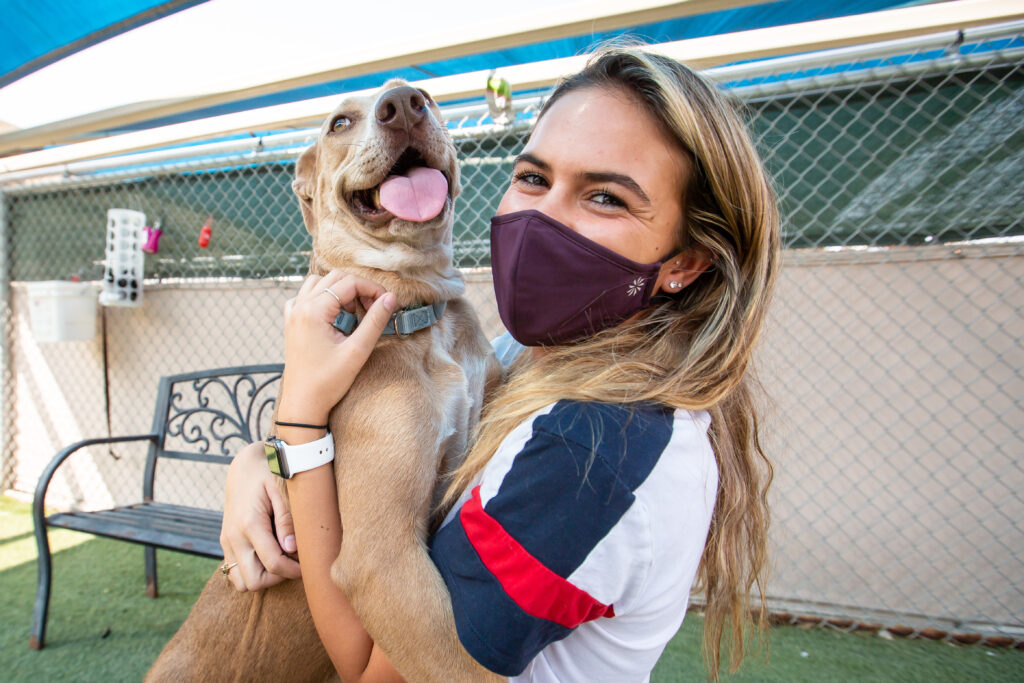
by Tony Gutiérrez
“There’s nothing in there,” Jenna Carlson, 20, says to Inca, a 5-year-old Labrador Retriever and Catahoula Leopard Dog mix, as the canine licks another dog’s bowl clean in the Lost Our Home shelter office on Hardy Drive. “We literally just had breakfast.”
Moments later, Inca is playing with Gidget, a 10-year-old black Chihuahua mix and owner of the aforementioned bowl. Gidget is a part of the shelter’s temporary care program, or TCP. Inca was wandering in south Phoenix when she was found.
Carlson, a student at Arizona State University, has been fostering her for several weeks until Inca can be adopted for her “fur-ever” home.
Meanwhile, TCP animals like Gidget are being cared for by other foster volunteers until their owners can care for them again.

Jodi Polanski established Lost Our Home in 2008 as a response to the mortgage crisis. The shelter used to provide accommodations for up to 90 days for pet owners who couldn’t care for their pets temporarily.
In light of the economic crisis brought on by the COVID-19 pandemic, the maximum stay has been extended to 120 days. Even with an eviction moratorium in Arizona extended through Dec. 31, Polanski is preparing for an influx in pets needing help.
“We would care for their pets for them for up to 90 says while they were sleeping on somebody’s couch and not have to go to a shelter,” Polanski said of the shelter’s early days.
After losing their homes, she said, “the last thing you want to do is lose a family member, too. We use that program, not just for foreclosures but also for people dealing with domestic violence.”
Natalie Kaska, a single mother from north Phoenix, is currently caring for Cash, a boxer in the TCP program. The situation is ideal, she says, because she’s unable to make long-term commitments.
“When you take him in, you know that you’re just helping them out while their owner can’t and is just getting things together,” Kaska said. “You know that they’re owned, they’re loved, and they’re missed.”

In the meantime, Kaska, with her 14-year-old daughter and 12-year-old son, can provide care for Cash. When they first brought him home, they were told he “likes to box.”
“We didn’t know what they meant by that. Then we quickly figured it out when we got home,” Kaska said, as she mimicked a boxing gesture. “He will take my son down to the ground, completely playing. My son giggles and laughs. They get so, hyper. They can go to town.”
If that’s not enough, the Kaskas are also fostering an adoptable cat, Cinder, who just gave birth to six kittens.
“They’re super cute. I have a million pictures,” she said. “You’d think I was their own mom. We just love to hold them.”
The litter is the second they’ve cared for. Before Cinder came, another dog they fostered gave birth to seven puppies. In the last year, including the litters, the Kaskas have fostered 29 animals. Every time they say “goodbye,” Natalie takes several photos with the goal of having a memory wall.
While it can be tough to say that “goodbye,” she said, “they know that there’s always another adventure coming. There’s always somebody coming.”

Carlson, whose family lives in Council Bluffs, Iowa, across the state line from Omaha, Neb., said while she is unable to adopt an animal in her current state of life, she missed her dog and wanted to at least “give a dog a nice home until it could be adopted.”
Inca will go running with Carlson every day, and occasionally go for a hike. Inca’s also a cuddler, Carlson said—and a snorer. While she won’t play with her own playthings, she will occasionally grab another toy that Carlson brought home from a trip.
“I have this little stuffed yak that I got in Scotland. Actually, it was sitting on one of my shelves, and she won’t play with her toys, but she’ll grab that and just hold it and look at me.
“I’m like, ‘I know that you know what you’re doing. Give me that back,’” Carlson, said, laughing. “She’s absolutely perfect. I would love to adopt her, but it would be unfair to her for me to adopt her at this point.”
Lost Our Home used to be able to facilitate adoptions through walk-ins, but since the pandemic started, the shelter has had to close its adoption centers.
“During the pandemic we immediately had to find fosters…and had a really good response,” Polanski said. “Foster homes are the primary place for pets, and shelters are the overflow.”
Currently, there are 170 pets in foster homes.
“We need fosters that can do fostering of big dogs and fosters who may have experience with active dogs,” she said, acknowledging the difficulty for people whose landlords don’t allow large pets or people with small children.
Other ways to support the shelter, Polanski said, include donating money, food, toys or other items, using the Fry’s Rewards program, encouraging others who are in a position to foster, sharing social media posts and, for landlords, to allow larger pets.
“This is a community-wide problem, and it can’t be all on the pet rescues,” she said. “It’s going to take the whole community to come together.”
Information: 602-445-7387 or lostourhome.org.

